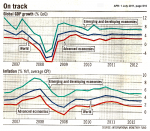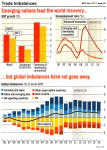Last weekend in the Financial Review, Andrew Clark began his article (on page 52) with the words:
“Australians don’t know if they’re in the middle of a pause that refreshes or the dullness before the deluge.”
That about sums up the general feedback I am receiving at the moment, from clients and colleagues alike.
Clark felt this probably stems from a combination of …
- a lack of Federal leadership,
- declining retail turnover,
- poor flow-on from the mining boom and
- the spectre of financial defaults overseas.
Presumably, this was behind the RBA’s decision to keep the cash rate on hold until next month — pending more economic data in the coming weeks.
On the plus side …
 According to the IMF … in spite of all the recent turmoil, the outlook for global economic growth appears quite rosy moving into the new financial year. [Read more…]
According to the IMF … in spite of all the recent turmoil, the outlook for global economic growth appears quite rosy moving into the new financial year. [Read more…]


















